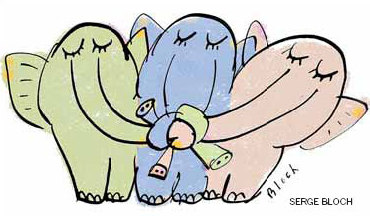Spirit of sisterhood not just for humans
Updated: 2012-05-06 07:43
By Natalie Angier(The New York Times)
|
|||||||

In animals as diverse as African elephants and barnyard mice, blue monkeys of Kenya and feral horses of New Zealand, longlasting and mutually beneficial relationships between females turn out to be the basic unit of social life, the force that not only binds existing groups together but explains why their ancestors formed herds in the first place.
Scientists are quantifying the benefits of that friendship. Researchers have found that female chacma baboons with strong sororal bonds have lower levels of stress hormones, live significantly longer and rear more offspring to independence than do their less socialized peers.
Similarly, wild mares with female friends are harassed less often by stallions and have more surviving foals than do solitary mares. Female mice allowed to choose a friend as a nesting partner will bear more pups than females forced to share space with a mouse they dislike.
And female elephants keep in touch with their friends through frequent exchanges of low-pitched vocalizations called rumbles. "We liken it to an elephant cellphone," said Joseph Soltis, a research scientist at Disney's Animal Kingdom in Florida. "They're texting each other, I'm over here. Where are you?"
Researchers have also determined that a female baboon with a small but devoted core of grooming companions will be less prone to spikes of the stress hormone cortisol than a female who casts her social net wide but not deep.
"To have a top three seems to be what's important here," said Joan B. Silk, a primatologist at the University of California, Los Angeles. A trio of friends, she said, provides "the kind of strong, stable relationships that help females cope better with stress."
Some signs of female friendship are easy to spot. Lionesses suckle one another's cubs. Female spotted hyenas greet one another through elaborate ceremonies of mutual trust.
Elephants touch trunks, share food. Dr. Soltis cited an elephant that rescued the baby of her closest friend after it stumbled into the elephant pool by hauling the panicked calf out with her trunk.
Marina Cords of Columbia University in New York has spent more than 30 years studying the blue monkeys of Kenya.
She has seen many violent territorial disputes between neighboring groups, in which the females fight while the males mostly watch. The females scream, bite, rip the flesh of an enemy's calf. And after the battle, "there's a frenzy of grooming among the females in the same group," Dr. Cords said.
Through grooming, the monkeys decompress, and remind one another that their fates are still linked. After all, should a group of blue monkeys grow too large it will split into factions, and the sisterly comrades of today may become enemies tomorrow.
For years female chimpanzees were viewed as asocial. As the so-called dispersing sex, females must leave their birthplace at puberty and seek asylum in another group, which means being surrounded by unrelated females all competing for the same goods.
But in a 10-year study of West African chimpanzees, Julia Lehmann of Roehampton University in London found that adult females cultivated friendships in myriad ways - staying within eye contact as they foraged, resting back to back afterward.
"Most of the females in my study have at least one close associate," she said. And female friendships last until one member of the bonded pair dies.
Dr. Lehmann does not know why female chimps seek female friends. But it's not as a deterrent to male aggression. "Male chimpanzees are so dominant that even two females can't do much against them," she said.
Researchers suspect the answer will be similar to what's been shown in female baboons: friendship is about biochemistry and predictability.
Robert M. Seyfarth of the University of Pennsylvania and Dorothy L. Cheney, writing recently in the Annual Review of Psychology on friendship's evolutionary origins, said baboon life is extremely stressful, especially for females.
"A friend gives you an element of predictability and certainty, and you can use that to buffer you against all the things you don't have control over," Dr. Seyfarth said. He added, "There's a biochemical component to this."
A friend calms and reduces cortisol that can weaken the immune system, and in so doing may help lengthen life - in baboons, humans and other group-minded kinds. "Yes, having coffee with friends is good for you," Dr. Silk said, "and we should all do it often."
The New York Times
(China Daily 05/06/2012 page11)